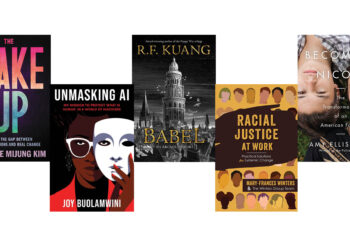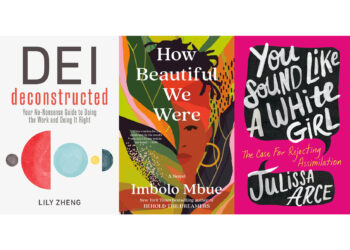
This is a follow-up to yesterday’s post, entitled “Why the iPad Marks the End of Price Controls for eBooks—and Why Publishers Have Won.”
I slept on it and changed my mind.
Just kidding.
I still hold to yesterday’s argument, which is that price controls for e-books, heretofore a serious concern among publishers, will shortly be thing of the past — much like newspapers, interest in actual space exploration at NASA, and any plans for a mechanically hoisted torch during future opening ceremonies of the Olympic Games.
Yes, publishers have indeed won the pricing wars. Unfortunately, it may be a hollow victory.
Ironically, the reason publishers may ultimately not have much cause for celebration is precisely the same reason that publishers won the pricing war in the first place: the iPad is not a dedicated e-book reader.
As you may recall through the haze of last night’s pricing victory celebrations (I did warn you not to break out the champagne just yet), I argued that because the iPad is not a dedicated ebook reader — and because there are so many ways of delivering content to the device — pricing controls are not central to Apple’s strategy nor enforceable even if they were. This argument carries beyond the product development strategies of One Infinite Loop to the coming hoard of multi-function tablets (as noted yesterday, everyone from Silicon Alley to Shanghai with a touch screen, a silicon chip, and a soldering iron is working feverishly on designing their very own tablet).
Because the iPad is not a dedicated ebook reader, there are, unfortunately, many things that users can do with the device other than read books. Unlike the Kindle, where publishers have the device all to themselves (OK, book publishers do have to share with publishers of newspapers, magazines, scholarly journals, and even a blog or two — but at least they are all publications), iPad users will be able to surf the Web, play games, watch movies, view their photo collections, listen to music, watch TV, send e-mail, work on a presentation, or access over 100,000 applications that do any number of distracting things.
Publishers may have won the pricing war, but the real struggle is going to be for users’ attention.
Let’s look at this in terms of flying to Tokyo (the “Godzilla Test,” if you will). Steve Jobs promised explicitly in his keynote that the iPad’s battery can power the thing from San Francisco to Tokyo, spouting video the entire way. Now, I’ve flown to Tokyo a number of times. Usually, I’ll watch an in-flight movie, catch a nap, do some work, and read a book. A lot of book reading takes place on flights to Tokyo. It’s a particularly good flight for reading — it’s long enough to really get into a book. Plus, unless you are in business class, the screens for movies are not very good and the selection is limited. And the seats are not really designed for laptop use so you can only do so much of that. Books are really ideal — as are tablet computers. Now, with an iPad (or whatever tablet I am using), I can be powered the whole way and I have everything on one machine — my book, movies, and work. But I also have games. And TV shows. And, if the plane has WiFi, I now have the entirety of the Web (minus the Flash pages). The question is, will I be able to finish that book, or will I be too distracted by all of the other things that are now quite literally at the tips of my fingers?
If I’m like most other people, I will get distracted. Indeed, most people apparently live in a state of perpetual distraction. According to the widely cited “Reading at Risk” report from the National Endowment for the Arts, people became increasingly distracted between 1992 and 2002, which correlates with the rise of the Web (a connection not lost upon the NEA). During this period, the number of adults in the US who read books not required for work or school declined by a precipitous 7%. The report blames television and the Internet for the decline. And that was before the television and Internet were on the same device as books. And well before that insidiously distracting Web could be accessed on a flight to Tokyo.
On the other hand, lamenting the fallen state of American book reading is a pastime nearly as old as, well, American book reading. The New York Times reported on the dismal state of American reading nearly 100 years ago, blaming a lack of reading on the distractions of “modern amusements.”
The New York Times piece makes reference to an article in the Atlantic Monthly by George Brett, Sr., chairman (at the time) of Macmillian. There are actually two Atlantic articles on the book trade authored by Brett appearing around this time. I highly recommend taking the time to read them as they prove definitively that the more things change, the more things stay the same.
In “Reading of Books Nowadays” (1914), Brett reports the complaint of a fellow publisher, describing how the “selling of books to the public had been curtailed in turn by the multiplication of cheap magazines, by the increasing use of the automobile, by the invention of the Victrola and other mechanical producers of music, by the invention of the motion-picture film, and last but not least, by the new fashion of dances which absorbed . . . the attention and time of young and old alike.”
In “Book-Publishing and Its Present Tendencies” (1913), Brett assigns the blame for lackluster book sales on “the inadequacy of the present methods of distribution.” He goes on to suggest that whomever “discovers or invents a new method which shall be both practical and effective for the distribution of books… will confer a boon upon the author . . .the public . . . and especially upon the publishers themselves, whose profits increase greatly as increasing numbers of copies are sold.”
The devil is in the details, of course, as the current CEO of Macmillian has noted.
The same National Endowment for the Arts has more recently announced a reversal in the 100-year-plus American spiral into illiteracy, with adults now reading more books than they did in 2002. If the trend holds, and if no new dance craze distracts us all (fortunately, that is one distraction book publishers do not have to contend with on the flight to Tokyo — though Guitar Hero is a possibility), perhaps there is hope for book publishers yet.
Discussion
17 Thoughts on "Why the iPad Marks the End of Price Controls for eBooks—and Why Publishers Have Lost"
Details of Apple’s pricing plans and the deals they’ve made with publishers are starting to emerge. It looks like there’s a variety of discounts built into the system. This sort of flexibility seems reasonable and reflects similar discounts in print.
Mike, I’m not sure I understand the connection between pricing and competition for the reader’s attention. Are you saying that because Apple’s model will drive up the prices while also providing a more integrated device, consumers are likely to shift their dollars from books to games (or other)? If so, can you cite any research that supports this theory?
Michael has really hit on a vastly under-appreciated aspect of the current pricing debates raging around digital goods like ebooks and MP3 music tracks. And there is quite a bit of research about this. As people have limited time and limited disposable income, researchers have found not surprisingly substantial substitution effects among different kinds of stuff, be it music, movies, books, video games etc. When these same kinds of goods are all available in one iTunes store, it’s hard to imagine the effect isn’t magnified.
I suggest as a starting point, this paper An Economist’s Guide to Digital Music which reviews some of the changing habits of consumers in the context of declining CD sales.
Another good resource on this topic is this paper “The Recent Growth of the Internet and Changes in Household-Level Demand for Entertainment. It’s a PDF available in Google’s quick view:
My point is that potential readers will be distracted by other things (apps, games, TV, videos, etc.) and will do less reading. My point about pricing is simply that even if publishers are free to set their own prices with no diktats from device makers, that may be small solace if book reading decreases as a result of alternative pursuits.
I am aware that this is an argument that has been made in one form or another for at least 100 years and books continue to flourish. I do think, however, that having books on the same device with movies, TV, games, etc. creates competition for attention to a degree not evident when those activities require different devices.
I’d be inclined to view this another way – ratehr than say that it’s a defeat for publishers because users of the iPad can do more than just read books, which is what Kindle and the Sony eBook Reader restrict one to do, the fact that the iPad allows users to read as well as do all the other things that they are used to doing on mobile devices actually broadens access to reading ebooks. It remains to be seen whether a device such as the Kindle that is limited in what you can do with it will succeed competitively against other more flexible options in the long run.
That is definitely a possibility. Additionally, there are a large number of people (myself included) who will be interested in a multi-function tablet that are not interested in a dedicated ebook reader. A boom in the tablet market will surely result in a concurrent increase in ebook sales. The question is whether those sales will simply cannibalize print book sales resulting in a zero sum game for publishers. It is entirely possible that we will see something like you suggest, where people who are not currently heavy book readers will start reading more books on their tablets because it is so easy. This is, in effect, a reverse-distration scenario, whereby ebooks distract the user from work, e-mail, game, and movies.
Even if it’s just a cannibalization of existing print sales, it may still have an interesting effect, given that the devices will provide access to an entire bookstore’s worth of content from any location. Think about the small racks of bestsellers available in airports–if everyone has a tablet and can buy any book they want while traveling, do sales of these bestsellers drop off and become distributed more widely among other titles?
That is an interesting point: the long tail scenario.
I propose developing a “Godzilla Index.” The Godzilla Index would measure consumption of media on flights to and from Tokyo. Passengers would be given a survey after the flight and asked what they watched or read on the plane and in what format.
I think you’re making the assumption that the experience of seeing bestsellers in an airport and buying one of them won’t be replicated in the digital (tablet) world. Sure, digital delivery makes it possible for any person to purchase any book at any time, but publishers (and book sellers) still have an incentive to market the “hot” titles. I think they’ll find a way to do it without the distribution of best sellers vs. long tail changing significantly.
I love your redefining reading as “reverse distraction.” Has a viral ring to it.
Some personal notes: As an avid Kindle user I can’t wait to try the iPad — especially to be able to read illustrated and full-color material, in particular, PDFs and web pages.
The Kindle was a great step forward, but the range of what can be read on it is terribly limited. I find that I can’t use the Kindle for any serious research of any kind, for example.
And how long will Amazon be able to adhere to its policy of licensing e-books to consumers, rather than selling them? We don’t own Kindle e-books and can’t move them from to a computer to read — a serious limitation, especially for anyone who works on more than one digital device when researching, reading, writing. I wonder when this point will enter the discussion about pricing: to me, a $9.99 Kindle e-book license is not nearly the same value as a $9.99 e-book purchase with few restrictions on use.
Last point: I find that instant sampling of e-books via wireless download is even more important than instant purchasing. Whenever I hear or see news of a new book (print or online review; talk show; BookTV), I can instantly download a sample if there is an e-book and read a chapter, to form my own judgment about the merits of the book.
Whereas, I seldom wand or need to have an entire book instantly and can wait a few days or more to get it in one form or another; because it will go on the lengthy queue of p-books and e-books piling up in my study. I easily sample in a ration 10:1 or more versus the books I purchase (or license from Bezos!).
Charles Levine
P.S. I am former publisher of Random House Reference, among other sins.
Hi Michael,
Regarding this:
“Publishers may have won the pricing war….”
I know what you mean, and don’t disagree, but it’s useful to remember that the real pricing war is still being waged, and that’s the war with the consumer. All that Macmillan did was assert publishing’s authority to command that offensive.
If consumers reject the prices that publishers set, not only will publishers have to relinquish power, but Amazon and Apple and other e-tailers will gain sympathy/credibility in the marketplace — echoing what happened in the music biz.
Publishing is in charge of its products, but only temporarily, and only as long as it can produce positive advantages and returns for everyone. Given that publishing seems determined first and foremost to protect physical book sales, I’m not so sure this moment won’t be seen as a Pyrrhic victory as events progress.
I found your two posts on this topic very insightful. I’m still convinced the real battle lines are being drawn up around proprietary content gatekeeping mechanisms as opposed to device types–just posted some thoughts on this topic.
![Reblog this post [with Zemanta]](http://img.zemanta.com/reblog_e.png?x-id=5f896a21-221a-49ad-90a8-1968cc46b7e8)


